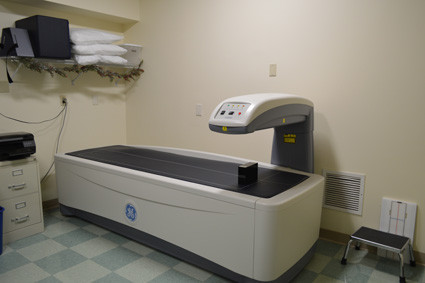-
Specialties
- Conditions
- Foot & Ankle Care
- - Conditions
- - Treatments & Procedures
- Treatments & Procedures
- Hand Surgery
- - Conditions
- - Treatments & Procedures
- Orthopaedic Traumatology
- - Conditions
- - Treatments & Procedures
- - Preventions & Safety
- Pediatric Orthopaedics
- - Conditions
- - Treatments & Procedures
- Spine Care & Surgery
- - Conditions
- - Treatments & Procedures
- Sports Medicine
- - Conditions
- - Treatments & Procedures
- Total Joint Surgery
- - Conditions
- - Treatments & Procedures
- Orthopaedic Surgery Center
- Diagnostic Services
Densitometry Diagnostic Test
Concord Orthopaedics offers on-site densitometry (DXA) at our Concord office.

Our DXA is a diagnostic test used to measure bone density. It is a "tool" used by physicians to diagnose osteoporosis, to follow medication usage than can cause osteoporosis, or to monitor the response to osteoporosis treatment.
A DXA scan takes between 10 and 15 minutes and is performed with the patient fully clothed and reclined on a padded table. A machine passes over the patient exposing them to minimal amounts of radiation, less than the amount of exposure in a routine chest x-ray. To learn more about how to prepare for your DXA scan, click here.
DXA machines feature special software that computes and displays the bone density results on a computer monitor. Test results provide the absolute bone density as well as two scores: t-score and z-score. The t-score shows the amount of bone a patient has compared to a group of young healthy adults. The z-score reflects the amount of bone a patient has compared to individuals of the same gender and age. Results of the t-score determine if the patient has normal bone density, osteopenia (low bone density) or osteoporosis. A t-score above -1 is normal. A t-score between -1 and -2.5 is osteopenia. A score below -2.5 is osteoporosis.
DXA scans allow for the detection of osteoporosis before a fracture occurs and help determine risk for fracture in the future. The rate of bone loss and response to osteoporosis treatments can also be determined with serial scans typically done every 1-2 years. Medicare reimburses for DXA every two years. The fracture risk assessment tool called FRAX can help estimate your chances of breaking a bone within the next 10 years. This will help you and your provider make decisions on whether you might benefit from taking osteoporosis medication.
For more information on Osteoporosis, click here.







